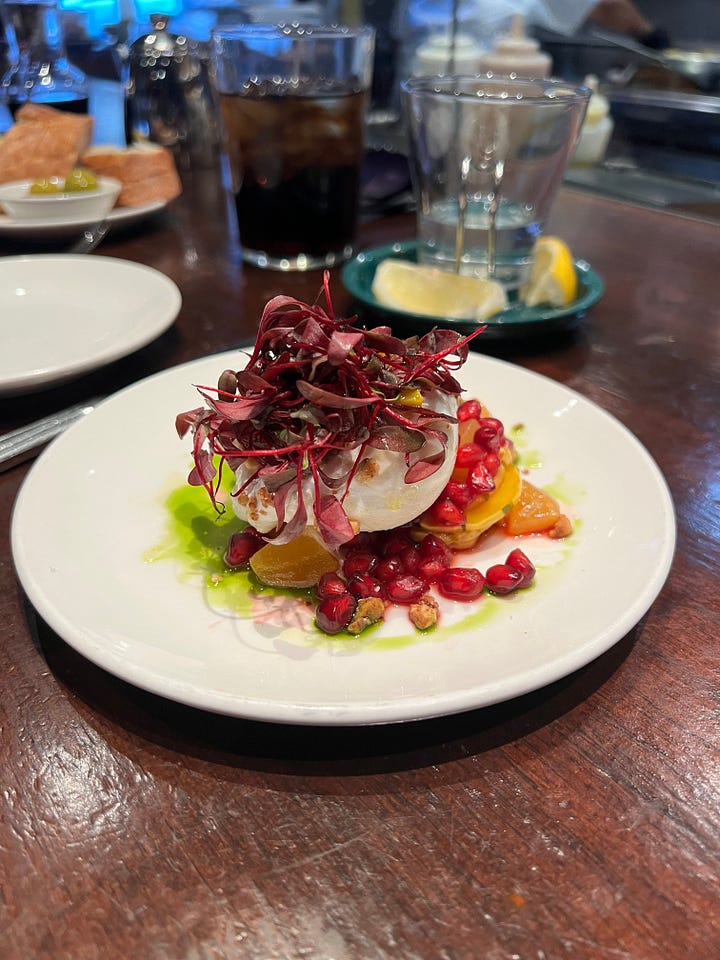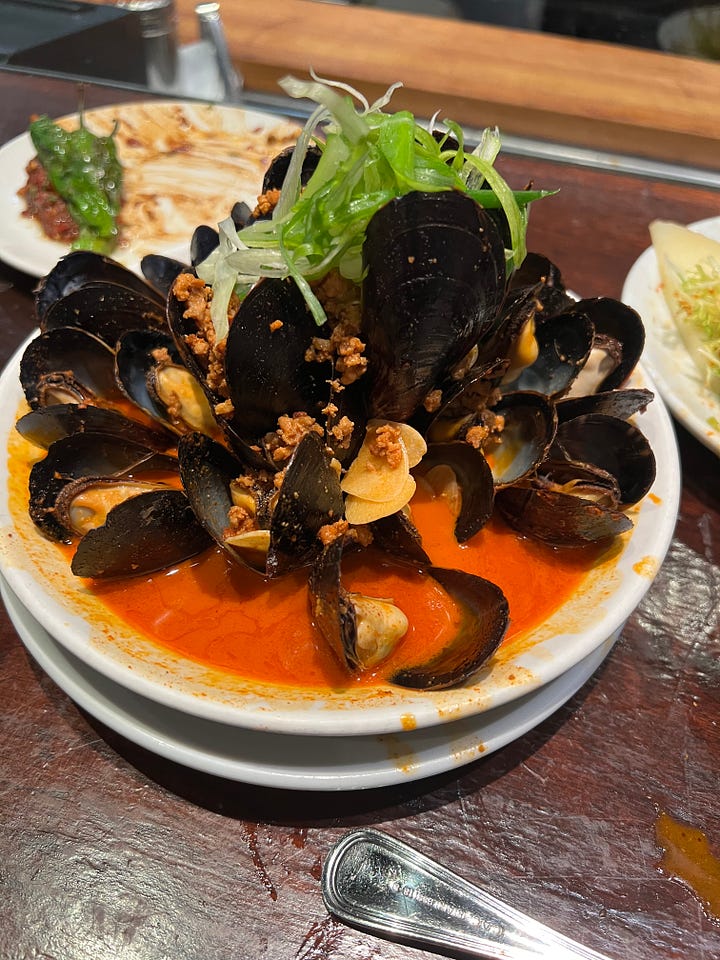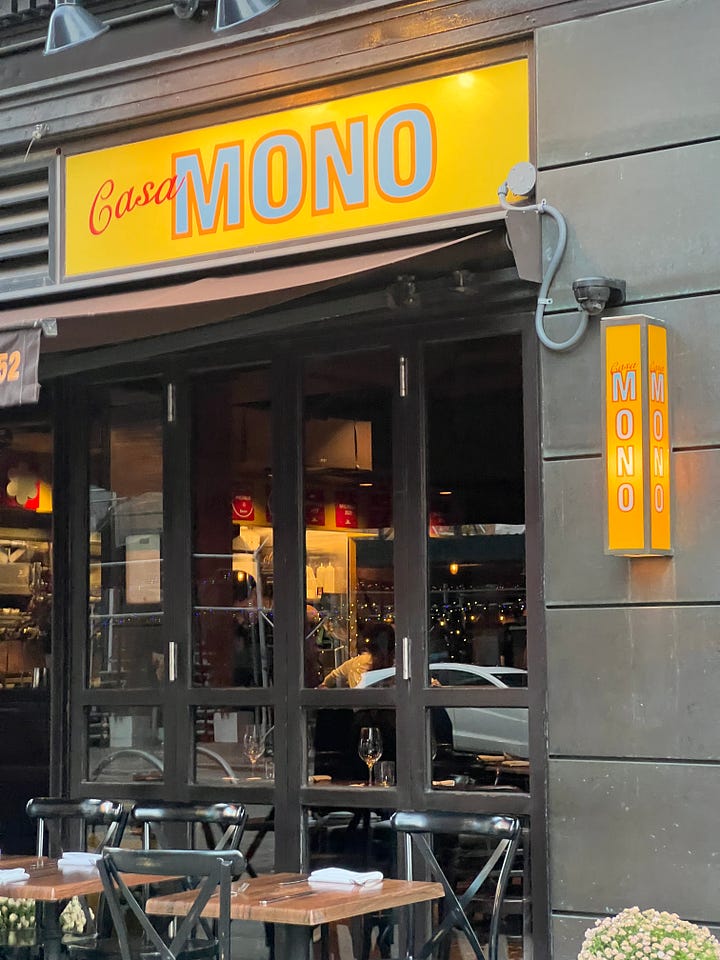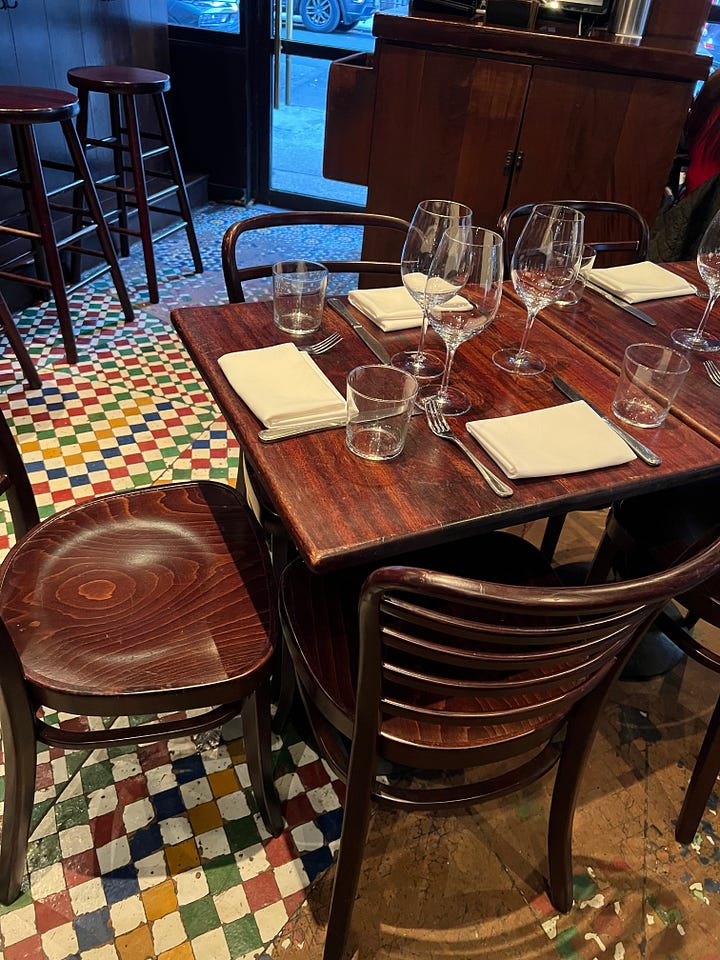The Mediator
When organized crime families have a dispute, and they want to prevent a war, there is one man they turn to: The Mediator.
I pulled two files from my leather satchel and reviewed my notes for my two parties. It was like the twentieth time, but I can never be too prepared. For our meeting, I chose the Spanish restaurant Casa Mano. Casa Mano was a neutral site on Irving Street in New York City. It was in a historic, trendy part of Gramercy, where the author, Washington Irving, lived. It was also near Pete’s Saloon, a NYC mainstay. It was also just a short cab ride from Little Tokyo in the East Village and Little Italy in SOHO.
The cozy atmosphere, multicolored tiled floor, mahogany-colored wood tables, and soft Spanish guitar music set the calm mood for what I hope will be a smooth mediation between my two combatants.
I studied my two parties again: Giovanni Bologna and Jiro Watanabe. Bologna is a Capo, and Watanabe is a Wakagashira within their respective organizations, just one step removed from their respective leaders. So, the first key to any mediation is having the right people in the room. Check.
After scanning the file again and reviewing my notes from our one-on-one interviews, I knew the positions and the grievances. Check.
Although I had my thoughts on a simple solution, as a mediator, my job is to facilitate rather than to solve. I will help these two men move from their hard positions and resolve their differences independently. Or so it would seem. Such is the art of facilitating a discussion that takes two parties who were angry at each other at the beginning and ends with the two parties feeling just a little dissatisfied, otherwise known as a “fair deal.”
My timing of closing the files and putting them back in my satchel was impeccable. Watanabe was ten minutes early. Japanese timeliness was always appreciated, respected, and to be expected. I stood up from my chair, bent at the waist ever so slightly, and tucked my chin for a slow nod to welcome my guest. He unbuttoned his black suit jacket and walked to the table. He also returned my gesture with a slight nod but no bend at the waist.
Watanabe sat silently, and I took my chair. His face was emotionless, and he did not speak. He looked around the restaurant, examining the sight lines, exits, windows, and other places assassins could hide or kill him. In this business, it is not a question of are you paranoid? But are you paranoid enough?
After scanning and taking a sip of water from his glass, he again scanned the room, but he wasn’t looking for dangerous spots. He pointed towards the back of the restaurant. He got up, buttoned his jacket, and left the table. I watched him as he headed for the bathroom. He had his left hand at his belt line—no doubt a finger knife was in his belt buckle. Of course, these mediations would be “weapon-free,” something both sides would ignore. I watched Watanabe cautiously enter the bathroom and then saw the door close.
Watanabe emerged from the bathroom a few minutes later; his expression had not changed, so he was satisfied that the urinals and toilets did not present a clear and present danger to him. This meant no weapons were stashed behind the toilet or any Mafia operatives in the bathroom. The Yakuza watched The Godfather one too many times.
He took his seat. We were at a square table with place settings for three people. I sat at 6 o’clock, Watanabe, at 3 o’clock, so he had his back to the wall and could see the door from his seat. Bologna would not be pleased to sit with his back to the door, but the first one to the battlefield gets the best position.
We sat at the table in silence for another eight minutes. He looked at me, expressionless, and I looked back at him, never losing eye contact with him, but not in an intimidating way, just keeping a quiet connection with him. It was meditative, to be honest. It reminded me of the game Stoneface, which I used to play with my twin brother. We would stare at each other until one of us broke and laughed. This was the only game we ever played that I had won every time. I just looked past the mirror image of my face and eyes and focused on the point at the top of his nose between his eyebrows. I never broke once. That practice came in handy today, as I did the same thing. I could tell Watanabe was impressed by my concentration and ability not to break or talk in social discomfort. But he was a Yakuza, and he would not break either.
The meeting was scheduled for 8 p.m. Watanabe broke away from our contest and glanced at his watch. It was 8:01 p.m. I got the feeling that was a statement as, “He’s late,” rather than a break from our Stoneface contest. It doesn’t matter, though. I win. A break is a break.
As we reengaged our Stoneface competition, it seemed like Watanabe was transfixed on something other than me. He was counting the minutes and seconds now that Bologna was late.
Six minutes later, Bologna sauntered in. I knew this not because I saw him, as my gaze was fixed on Watanabe, but because I saw Watanabe’s face change as he did not hide his frown. He then looked down at his watch for the second time. Again, I’m pretty sure that was for me, as he knew exactly what time it was as he had been counting the seconds. Now, the meeting would start on the wrong foot, as Bologna was operating on Italian rather than Japanese time.
Bologna sat down and nodded to each of us. No hands were extended at this time. Bologna looked around the restaurant, then at me, showed me his hands, and said, “Going to wash my hands. Be right back. Where’s the bagno?”
I turned around and pointed. Watanabe kept his gaze on Bologna, and Watanabe’s mouth seemed carved in a permanent frown. Bologna walked off and gazed around the restaurant. Unlike Watanabe, who looked for points where he could be murdered, Bologna took in the restaurant’s decor and atmosphere. Or it was an act to look unassuming, but he was doing the same thing. While he might actually want to wash his hands, he was undoubtedly going to also search for hidden weapons or the strange coincidence that another tattooed Japanese man might be in a Spanish restaurant.
Bologna returned, and as he did, the food started to arrive. Both men looked at me since there were no menus on the table, and they did not order the food.
I broke the silence, “I took the liberty of ordering for you, gentlemen. Please let me know if my selection displeases you.”
For Watanabe, the wait staff put a plate of Fluke Crudo. The fish was sauteed in coconut milk with carrot preserves. For Bologna, they placed a bowl of muscles with chorizo and paprika spice. And for me, a Spanish Buratta with squash, golden beets, and pomegranate. A Mahou cerveza for Watanabe, and La Sangria De La Casa for Bologna, and a soda water with two limes for me. I’m not much of a drinker.
Both men took initial bites of their food. Watanabe looked at me and bowed his head. Nailed it!
Bologna had several bites of his food before he said, “This is fucking good.”
Nailed it again!




After each man ate a little more, I began addressing each of the men in formal terms. For Bologna, I used Italian for mister or “Signore.” For Watanabe, I would use the honorific Japanese term “Sama” at the end of his name. Not using the more common “san” showed that I recognized his elevated position.
“Gentlemen, we are here because both of your esteemed organizations feel it is better to talk out the troubles than the costly event of a war with unnecessary losses and disturbances to each of your businesses. Is that correct?”
Both men nodded silently, each not wanting to say the first word.
“Excellent. I have spoken with each of you individually, and you are both intelligent, reasonable, and sensible men. You are also very dedicated to your organizations, and your hearts pump with pride, and each sees your position as in the right.”
Again, both nodded in silence and stared at me to see where I was going with this.
“For you both to be in the right at the same time is a contradiction. The first rule of logic is that contradictions cannot exist. If one does, check your assumptions because one must be incorrect.”
Both men looked at each other and then back at me. Watanabe put down his fork, crossed his arms, and sat back in his chair. Bologna looked away from the table, wiped his mouth with his napkin, moved his jaw from left to right, and squinted his eyes—exactly what I expected.
“Gentleman, the territory in question is the Bowery Grand Hotel. This one is tricky, as based on the treaty of 2018 between both of your organizations, the Huang Tse controlled this hotel, but they sold it to Watanabe-samas organization when they stated that Signore Bologna’s organization did not meet their offer.”
Bologna spat out, “That’s a fucking lie. They said yes to our offer and then stabbed us in the back, used our fair offer as leverage to get a better deal from them.” He pointed his index finger at Watanabe.
Again, in silence, Watanabe glared at Bologna, then, still with arms crossed, turned his head to me and leaned in. He said nothing, but his face said, “Are you going to say something?”
I took the hint, “Signore Bologna, we need to keep this civil. As you both agreed to, let's keep our gestures and language non-accusatory and refrain from any disparaging statements. You both agreed in our pre-mediation discussions and signed an agreement stating as such.”
Bologna sat back in his chair and put his hands in a “hands-up position,” although his elbows were bent, so his hands were lower than shoulder height. But that seemed to satisfy Watanabe, and his objection to Bologna’s accusatory language was noted and sustained.
I continued, “I agree. The facts of the case are that Signore Bologna’s organization had a deal in hand that was later turned down for a more lucrative offer from Watanabe-sama’s organization.”
Bologna nodded in approval while Watanabe’s eyebrows raised and lowered quickly as to say, “So, what? Business is business.”
I needed to get them to start agreeing. Even if we agreed that today was Thursday and the sky was blue. The first step in getting the parties to lower their defensive postures is to get them to start agreeing, especially when the parties would have no problem murdering each other.
“Signore Bologna, would you agree that Watanabe’s organization might not have known about your deal to purchase the Bowery Grand Hotel?”
“Yeah, it’s possible,” he paused, “but not likely.”
Watanabe kept his arms crossed and shook his head.
I asked Watanabe, “Did you know that Signore Bologna had a deal for the hotel.”
He looked at me, tilted his head, and shrugged his shoulders.
“What’s the matter? Don’t you speak English?” Bologna barked.
Watanabe shot a murderous glance at him.
“Signore Bologna, I understand Watanabe-sama’s gestures, and if I’m wrong, I am very confident he will speak up.”
Bologna let out a huff, and I continued.
“If we agree that Watanabe-sama’s organization had no knowledge of the purchase, can we agree that there was no intent to offend or create a problem?”
Both men nodded in acquiescence.
I tried to keep my face neutral, but inside, I thought, “Thank God! Okay, now we can get somewhere!”
“Now, Watanabe-sama’s organization put some money into the hotel takeover and incurred some transaction costs. Is that true, Watanabe-sama?”
Watanabe returned to eating his food and nodded, looking at his food as he ate.
“Signore Bologna, does that sound right to you? Would they incur some costs?”
“Yeah, of course, I’m sure they did.”
Bologna slurped up a few muscles while I let the agreement settle in. I took a few bites of my burrata. Damn, it was amazing. The burrata was perfect. It almost melted in my mouth. And the way the other men were eating their food, I could tell, despite the tenseness of the moment, they were enjoying the food, too.
I waited, but not for too long, as Bologna pushed his bowl away.
“What about this? Say we pay you $300,000 for your troubles on top of what you paid for the hotel?”
Watanabe said his first words of the night. “Plus five percent.”
Bologna looked at me, then shrugged his shoulders and said, “Five percent of what, the fucking moon?” He pointed to the ceiling.
Watanabe stared through his head and replied curtly, “Five percent of the gambling revenues from the basement casino.”
Bologna looked at me put pointed at Watanabe as he said, “This guy is fucking crazy. Five percent. Bipppsish!”
I said nothing and looked at Watanabe. He did the same, and we resumed our Stoneface game. This went on for about thirty seconds, and then he sat back in his chair.
“$600,000, no five percent.”
Bologna replied immediately, “$300,000 is more than fair.”
Watanabe said his second complete sentence. “We did more than just purchase and fix up some things. The Haung-Tse did not leave the hotel in great condition. I need something more, not only because of the repairs and work but also because we had to rebuild the hotel's reputation with our patrons so they felt comfortable. Now, your organization would benefit from our sweat equity. We need a return on that.”
I looked at Bologna for a response. He pursed his lips, and I could see his mind formulating a response. While not as stoical as Watanabe's, his facial gestures did not reveal much besides that he was processing.
“Okay, if you allow your patrons to continue visiting the casino, we will give you $50,000 now and 5% of the take up to $500,000 or three months, whichever comes first.”
That was a good deal. I tried not to get too excited at the prospect. It was way more than I expected, but if the Yakuza were willing to allow their patrons to visit the casino and gamble there, then the Mafia would have a built-in customer base to get them started.
Watanabe replied courteously, “And we want to keep the name, The Golden Crane. The crane is an auspicious symbol for the Japanese, and the door to the casino was painted ornately, with a wondrous golden crane.”
“Is that acceptable, Signore Bologna?” I asked.
“Sure, I don’t give a fuck what kind of bird is on the door.”
“Excellent,” I declared, “so, the Bowery Grand Hotel will be turned over for the price paid plus an additional $50,000 and five percent of the casino take for three months or $500,000 in total, whichever comes first. The artwork and the name The Golden Crane remain, and all of Watanabe-sama’s patrons will receive the same hospitality and privileges with Signore Bologna’s organization. Are we in agreement, gentlemen?”
Bologna held up his glass of sangria and said, “Salute!”
Watanabe held up his beer and said, “Kanpai!”
I held up my soda water with two limes bobbing around the bubbles, and we all touched glasses and drank.
We all stood up, and I shook Watanabe’s hand first since he was to my right, he extended his hand and bowed his head slightly. Then I turned to my left to shake Bologna’s hand. After shaking my hand, Bologna extended his hand to Watanabe. There was some hesitancy, but Watanabe grasped it, shook it, and then let go quickly.
Watanabe reached inside his jacket pocket and produced a rectangular envelope hand-painted with a blooming pink cherry blossom tree. With two hands, he presented the envelope to me. It was thick and weighed about what 100 brand-new crisp Benjamins would weigh.
I received the envelope in two hands while bowing and saying, “Arigatou gozaimasu.”
He turned to me, bowed his head slightly, and walked out the door expeditiously and directly.
Bologna reached into his jacket pocket and pulled out a manila envelope, also weighing about 100 Benjamins. He handed it to me with his left hand, and in his right, he held out a hand. I shook his right hand and took the envelope with my left. He released my right hand, patted me on the shoulder, and said, “Good job.”
As he turned and walked out, he raised his right hand and said with his back to me, waving his hand in a circular motion, “Nice place, here. Nice place.”
I sat down, put both envelopes in my satchel, and finished my tasty burrata.
As the waitstaff cleared the plates and I paid the bill, another man walked into the restaurant and sat at my table.
He stared at me and me him. Another game of Stoneface ensued. About five minutes later, the man, who looked exactly like me, laughed.
“Man, you always get me at that.”
I smiled and then stood up to hug my twin. “How are you, brother?”
“Yeah, I’m good, you know, putting away the bad guys.”
“Oh yeah, and I’m making sure the bad guys don’t make a mess of this fine city of ours.”
He smiled and chuckled, saying, “Yeah, I guess you do.”
“You want something? The food is amazing here.” I asked.
“Nah, I’m having dinner with Amy later.” He paused and then jutted his chin at me and lowered his voice. “So, did I just see Giovanni Bologna and Jiro Watanabe leave here?”
I replied with a shit-eating grin, “I can neither confirm nor deny that those two men you mentioned were in this eating establishment.”
“There was some reported shooting by both their gangs down at the Bowery Grand Hotel. Do you know anything about that?”
“Just what you know, mister district attorney.”
He squinted at me, pointed a finger at me, and barked, “You’re lying. You know more!”
I put my hands and wrists out together, “Lock me up then.”
“I would, you know!” His face turned serious.
“Yeah, and if you did, you know what I would do?” I gritted my teeth at him.
“What?!” He drew his face closer to mine.
I replied calmly, “I’d call Mom and tell on you.”
He squinted his eyes to the point they were almost closed. “You wouldn’t!”
“I would, in a fricken heartbeat.”
We couldn’t hold it any longer and started laughing so loud people in the restaurant started looking at us.
I wiped my eyes from the hysterics. We could always crack each other up.
“I miss you, Jay.” I reached out and grabbed his shoulder.
“Yeah, I miss you too, John-John.” He did the same.
“So,” he asked me, “peace in my streets?”
“Yeah, brother, peace in your streets. You do your thing your way, and I do my thing my way. Together, we keep the peace.”
We shared a smile that only twins can appreciate—that feeling that there is at least one person in this world who absolutely loves, accepts, and understands me like no other, and I, him.
We are two sides of the same coin. He fights crime and criminals with laws and police, while I mediate disputes between criminals who I encourage to create the crimes no one really cares about and avoid the ones my brother does. Together, we do our best to keep the peace in this city we love.
Author’s Note
At the beginning of the week, I wondered what I would create for “Fiction Friday?” I wanted something fun to write, so I started looking at the list of story topics I kept. But then it hit me. I just completed a week-long certificate program at Harvard on Mediation. So what better to reinforce what I learned than to write a fun short story. I just needed a situation that required mediation and one that would be interesting.
My most reliable companion is my writing process is asking myself, “What if?” It always leads me down a path where I can create a situation for my characters that has them work out a problem or challenge with pretty high stakes if they fail. In this case, I figured let me create a character that is a mediator. But he mediates disputes between organized crime families and gangs. Those are pretty high stakes since failure might end up in murder.
The characters I chose were Bologna and Watanabe. Both happen to be common names, but Bologna is the maiden name of my Great-Grandmother, Teresa Bologna, and she was from Palermo, Sicily. Watanabe, also a common Japanese name, was the name of my Judo Sesnai.
Then, the main character, I thought, I’ll make him an identical twin, and his brother a District Attorney in New York City. How opposite would that be?
Everything else fell into place after that. The Bowery Grand Hotel is a real place too, and it’s smack in the middle of a territory that either party could easily claim.
I do really enjoy writing short stories, as I can set up the world in just a few sentences and it’s enough for the reader. Then, I can focus on the dialogue and the story, while giving a picture of the main character, but a reader does not need the same level of detail since they are only invested in them for a few pages.
The part I enjoyed the most was the end when the two brothers came together and had their mock argument. They both understood that they were attempting the same thing, but they had different methods of accomplishing their objectives, and they were okay with it. That connection between twins, and the literalness of seeing your own face in someone else and knowing that your worlds are the same but different. I found that interesting to explore, albeit briefly.
I would love to know your thoughts on the characters and their lives, and if you want to see more of characters like these.
Enjoy the long weekend!
Chris K. Jones




What a great short story! Characters well captured. You’re very good at getting at studying cultures and that keeps the reader in the story. Nicely done!